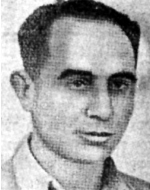Globerman, Joshua
Son of Esther and Solomon, was born in 1905 in the city of Kalinkovici in White Russia. In 1919, during the upheavals and the dread of the riots, he organized the youth of his age in the Hechalutz Hatzair movement, and they gave great help to the Hehalutz members in Jewish self-defense. Then Joshua’s organizational and military abilities were first revealed. He continued to organize pioneers, went to training and was arrested, and on the basis of exchange he was allowed to leave Russia and immigrated to Israel in 1925. In Israel he worked in the Ein Tivon Company of Kibbutz Ein Harod and was sent to Jerusalem with A group of friends, as a member of Hakibbutz Hameuhad, in order to conquer the city. In Jerusalem he worked in a quarry, was wounded, and when he recovered he joined Kibbutz Yagur. In the kibbutz, he devoted himself to the field of floriculture and mechanics, and was trained in theory and practice. He looked for ways to improve the work and even prepared material for the book on the foliage. He was one of the leaders of the kibbutz debates and discussions on cultural and social issues, and devoted himself especially to the defense of the place. Joshua was in charge of courses for deputy commanding officers. When the Hagana commanders realized his talents and his tendency toward security, he was entrusted with many roles of instruction and leadership, planning and command, on a provincial level, and then on my country as well. He has steadily supplemented his military knowledge and leadership in all fields of defense: in material, in technique, in tactics, and in culture and spirit. In particular, he succeeded in creating a psychological connection with the youth and in matching roles to the people who deserved them. He also wrote, and inspired others to write, brochures on defensive topics in various fields, and these pamphlets served as a nucleus for military literature in Hebrew. At the outbreak of the 1936 riots, he was called from the farm to serve in the Hagana, and during these years he was the commander of the infantry unit in the north of the country and organized Hanita’s security in its founding, and was appointed Head of the National Guidance Office of the Haganah Headquarters. Yehoshua worked in all areas of the Hagana’s work: planning, training, arming, youth, society, and was a national supervisor on behalf of the General Staff, and his contribution was also in the struggle against the British. His family in Yagur and his small daughters already knew that Dad was only a guest at home Estate and later commander of the Tel Aviv District. After the UN General Assembly partition resolution and the outbreak of the War of Independence came to Jerusalem to oversee the defense of the city. On December 8, 1947, when he went to Tel Aviv to take command of a fighting brigade in the Judean Lowland, he was killed by Arab gunfire near Latrun and after a dignified funeral in Tel Aviv was brought to eternal rest at the cemetery in Yagur. On the first anniversary of his death, Yagur published a book in his memory. The IDF camp in Nitzanim is named after him.
